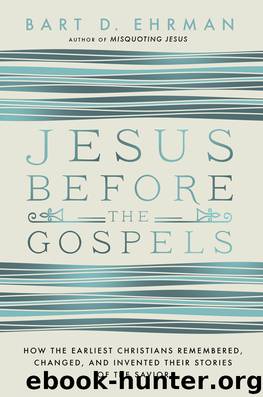Jesus Before the Gospels by Bart D. Ehrman

Author:Bart D. Ehrman
Language: eng
Format: epub
Publisher: HarperCollins
Published: 2016-01-20T16:00:00+00:00
Swords in the Garden
In all four Gospels, at least one of Jesus’s followers is armed when he is arrested. In the Synoptics, this unnamed follower draws his sword and strikes the slave of the high priest, cutting off his ear (see Mark 14:47). In John’s Gospel we learn that the sword-bearing disciple was Peter (John 18:10). Jesus puts a halt to his follower’s violent inclination, however, and humbly submits to his arrest. In Luke’s version he does so only after healing the ear (Luke 22:51).
From the eighteenth century until the present day (see my discussions of Reimarus in chapter 1 and Aslan in chapter 2), there have been scholars, and nonscholars, who have thought that this incident in the garden is both altogether plausible and indicative of the character of Jesus’s message and mission. In this opinion, the incident must be historical for a rather simple reason. What later Christian would make up such a story? When Christians were telling and retelling their accounts of Jesus’s life in the years after his death, of course they would want him to appear entirely palatable to their audiences. Nothing would make Jesus more palatable in Roman eyes than the view that he was a peace-loving promoter of nonviolence, not a violent insurrectionist against Rome. If Jesus allowed his followers to be armed, however, that would suggest he was in favor of them carrying out acts of violence. If later Christians would not make up the idea that Jesus promoted violence, then no one could make up the idea that his followers were armed. Following this logic, the story of the sword in the garden is not an invented tradition but a historical fact. Jesus’s followers, therefore, were armed. Moreover, if they were armed, so this reasoning goes, then Jesus must have anticipated and even promoted an armed rebellion.
There’s a good deal of sense to this view and it is easy to see why it is attractive. Still, at the end of the day I don’t find it convincing. This is for two reasons, one that is obvious but ultimately unpersuasive, and the other that is less obvious but absolutely (to my mind) compelling. The obvious objection is that throughout all of our traditions, Jesus is regularly and consistently portrayed as a teacher of nonviolence. “Love your neighbor as yourself.” “Love your enemies.” “Love those who persecute you.” “Blessed are the peacemakers.” “Render unto Caesar the things that are Caesar’s.” “The one who lives by the sword will die by the sword.” Throughout independent accounts of Jesus’s life he is shown to promote loving and submissive nonviolence. Doesn’t that squelch the possibility that Jesus favored armed rebellion and that his followers were armed?
The reason that argument is not totally persuasive is that Christians may have wanted to portray Jesus as nonviolent, and remembered him as nonviolent, for reasons for their own. Christians themselves were often opposed by the authorities and would have wanted to stress that they were no threat and no danger. In their own defense they argued that they were peace-loving people.
Download
This site does not store any files on its server. We only index and link to content provided by other sites. Please contact the content providers to delete copyright contents if any and email us, we'll remove relevant links or contents immediately.
The Secret Power of Speaking God's Word by Joyce Meyer(3220)
Signature in the Cell: DNA and the Evidence for Intelligent Design by Stephen C. Meyer(3138)
Real Sex by Lauren F. Winner(3023)
The Holy Spirit by Billy Graham(2953)
The Gnostic Gospels by Pagels Elaine(2531)
Jesus by Paul Johnson(2363)
Devil, The by Almond Philip C(2333)
23:27 by H. L. Roberts(2252)
The Nativity by Geza Vermes(2231)
Chosen by God by R. C. Sproul(2165)
All Things New by John Eldredge(2162)
Angels of God: The Bible, the Church and the Heavenly Hosts by Mike Aquilina(1969)
The Return of the Gods by Erich von Daniken(1946)
Angels by Billy Graham(1926)
Knowing God by J.I. Packer(1859)
Jesus of Nazareth by Joseph Ratzinger(1811)
The Gnostic Gospel of St. Thomas by Tau Malachi(1799)
Evidence of the Afterlife by Jeffrey Long(1790)
How To Be Born Again by Billy Graham(1782)
